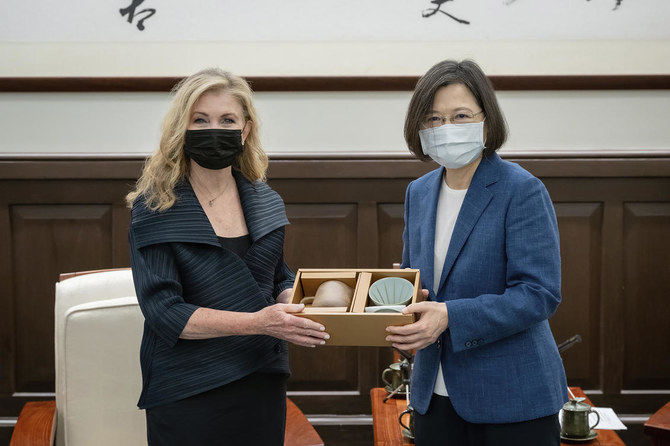TAIPEI: US senator Marsha Blackburn met with Taiwan’s President Tsai Ing-wen on Friday, in the second visit by members of Congress since House Speaker Nancy Pelosi’s trip earlier this month sharply raised tensions with China.
In her remarks, Tsai pointed to the large-scale military exercises that China launched in response to Pelosi’s visit, as well as Russia’s invasion of Ukraine, as posing challenges to democratic governments such as the US and Taiwan.
“These developments demonstrate how authoritarian countries are disrupting and threatening the world order,” she said.
Blackburn, a Republican from Tennessee, reaffirmed shared values between the two governments and said she “looked forward to continuing to support Taiwan as they push forward as an independent nation.”
China claims self-ruled Taiwan as its own territory, to be taken by force if necessary, and sees high-level foreign visits to the island as interference in its affairs and de facto recognition of Taiwanese sovereignty. China’s recent military drills were seen by some as a rehearsal of future military action against the island, which US military leaders say could come within the next few years.
In their meeting, Tsai and Blackburn also underscored the importance of economic links, especially in the semiconductor sector, where Taiwan is a world leader and the US is seeking greater investment at home.
Blackburn arrived in Taipei late Thursday after visiting Fiji, the Solomon Islands and Papua New Guinea as part of a US push to “expand our diplomatic footprint in the area,” her office said in a statement.
“The Indo-Pacific region is the next frontier for the new axis of evil,” Blackburn, a staunch supporter of former President Donald Trump, was quoted as saying. “We must stand against the Chinese Communist Party.”
China has been making inroads in the western Pacific, signing a broad security agreement with the Solomons that the US and allies such as Australia see as an attempt to overthrow the traditional security order in the region.
Pelosi was the highest-level member of the US government to visit Taiwan in 25 years. China’s response was to announce six zones surrounding the island for military exercises that included firing missiles over the island and sending ships across the midline of the Taiwan Strait, seen as a buffer between the two sides. Some of the missiles landed in Japan’s exclusive economic zone.
Following Pelosi’s trip, a delegation of House and Senate members visited. This week, Indiana’s governor made a visit focused on business and academic cooperation. USpoliticians have called their visits a show of support for the island.
“I just landed in Taiwan to send a message to Beijing — we will not be bullied,” said Blackburn in a tweet early morning Friday. “The United States remains steadfast in preserving freedom around the globe, and will not tolerate efforts to undermine our nation and our allies.”
Taiwan also welcomed senior Japanese lawmakers this week.
The island’s Foreign Minister, Joseph Wu, said Friday he welcomed all such visits by foreign government officials.
“Because of the military pressure China has demonstrated against Taiwan, there are more people than ever who want to come and show their support in Taiwan,” Wu said. “You have seen quite a few already. And I can tell you there will be more.”
During her three-day visit, Blackburn is also due to meet with the head of Taiwan’s National Security Council.
Washington has no official diplomatic ties with Taipei in deference to China, but remains the island’s biggest security guarantor, with US law requiring it ensure Taiwan has the means to defend itself and to regard threats to the island as matters of “grave concern.”
Taiwan and China split in 1949 after a civil war and have no official relations but are bound by billions of dollars of trade and investment.
China has increased its pressure on Taiwan since it elected independence-leaning Tsai as its president. When Tsai refused to endorse the concept of a single Chinese nation, China cut off contact with the Taiwanese government.
US congressional visits to the island have stepped up in frequency in the past year.
On Thursday, the executive branch of Taiwan’s government laid out plans for a 12.9 percent increase in the Defense Ministry’s annual budget next year. The government is planning to spend an additional 47.5 billion New Taiwan dollars ($1.6 billion), for a total of 415.1 billion NTD ($13.8 billion) for the year.
The Defense Ministry said the increase is due to the “Chinese Communists’ continued expansion of targeted military activities in recent years, the normalization of their harassment of Taiwan’s nearby waters and airspace with warships and war planes.”
Also Thursday, the Defense Ministry said it tracked four Chinese naval ships and 15 warplanes in the region surrounding the island.




























